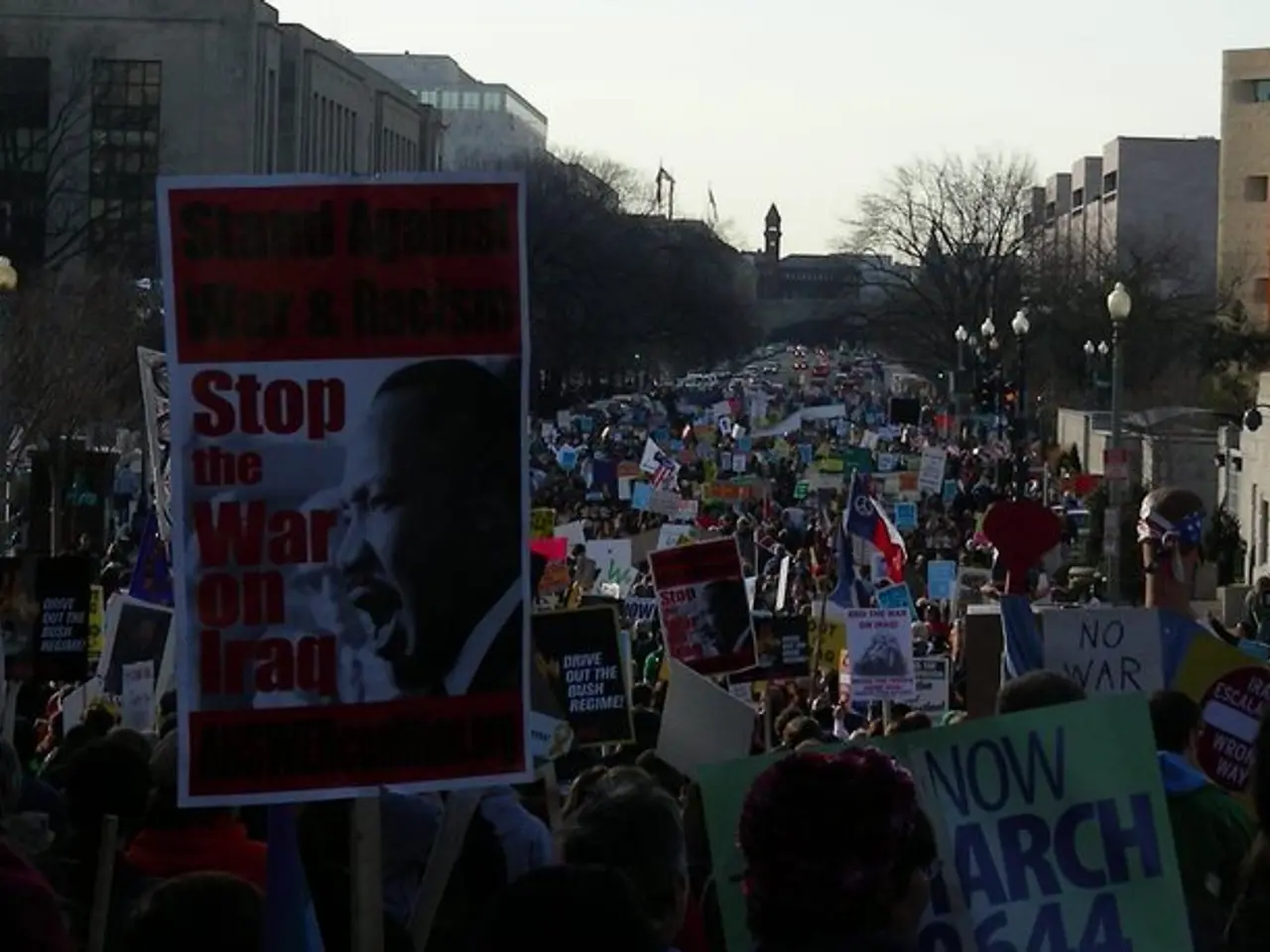Potential 2024 civil unrest could erupt unexpectedly, across various locations
In the summer of 2024, a wave of hate-fuelled unrest swept across over 30 towns and cities in the UK, culminating in riots that left communities divided and public safety compromised.
The riots in Tamworth and Rotherham saw attempts to set fire to hotels housing people seeking asylum, while in Middlesbrough, a group of men erected a checkpoint during the unrest, stopping cars and interrogating drivers. These incidents were not isolated, as numerous protests were held outside hotels housing asylum seekers in various towns, including Epping, Canary Wharf, Portsmouth, Southampton, Bournemouth, Leeds, and Norfolk.
The violence in Ballymena bore striking similarities to the riots that occurred across the UK in the summer of 2024. The area experienced a campaign of anti-immigrant violence, with attacks on Filipino residents such as the firebombing of Kevin Rous's home while he was working a night shift at the Wrightbus factory. Another Filipino resident, Raymond Labaniego, barricaded himself in his home as a mob attacked it.
These incidents were not just isolated incidents but part of a broader pattern of anti-immigrant sentiment that has significantly influenced political conversations and public safety in the UK. Over recent years, British anti-immigration attitudes have hardened, with political rhetoric scapegoating immigrants, particularly refugees arriving on small boats, despite making up only a small fraction (2%) of total immigration.
This hardened view has contributed to tensions in communities where migrants settle, as exemplified by the firebombing of immigrant homes in Ballymena. Public opinion data show that a majority of British citizens, especially within working-class social groups, believe immigration levels have been too high over the last decade.
Experts argue that much of this hostility stems from a profound "empathy gap," where citizens misunderstand the emotions and realities of refugees and asylum seekers, often perceiving them as threats or criminals rather than vulnerable individuals with hopes and needs. This empathy gap fosters fear and misinformation, intensifying the political and social conflicts surrounding migration issues.
Moreover, anti-migrant narratives have surged online, with a dramatic increase in anti-migrant posts, contributing to a hostile climate that amplifies the risk of violence and disorder.
Reform UK leader Nigel Farage has spoken of "civil disobedience on a vast scale," while Deputy Prime Minister Angela Rayner has warned of a potential "summer of riots." As the UK grapples with these issues, it is crucial to address the empathy gap and combat misinformation to improve community relations and ensure public safety.
In Epping, where a resident is on remand and awaiting trial for alleged sexual assaults, far-right extremists have been at the centre of the protests. Bottles and fireworks have been thrown at police and two security guards were recently attacked. The town's mosque was also targeted during the 2024 riots, with bricks being thrown at it.
Continuing to fan the flames of bigotry will only ensure that they spread. Bridging the empathy gap and addressing misinformation are critical to calming tensions and improving community relations. As the UK moves forward, it is essential to prioritise unity, empathy, and understanding to ensure a safer, more inclusive society for all.
[1] Migrants and Asylum Seekers: Public Attitudes and Perceptions, YouGov (2023) [2] Ballymena Riots: A Summer of Unrest, BBC News (2024) [3] Immigration Attitudes in the UK: A Decade of Change, Migration Observatory (2024) [4] The Empathy Gap: Understanding and Addressing Anti-Immigrant Sentiment, Amnesty International UK (2024) [5] Online Hate Speech and the Rise of Anti-Immigrant Narratives, Ada Lovelace Institute (2024)
- The incidents of violence against migrants and asylum seekers, such as the firebombing of homes in Ballymena and the protests in Epping, suggest a concerning pattern of anti-immigrant sentiment that has infiltrated both general-news and crime-and-justice discussions in the UK.
- The hardened anti-immigrant attitudes in the UK, apparent in surveys and online posts, have played a significant role in fueling political debates and contributing to the escalating crimes against migrants and asylum seekers, underscoring the need to focus on bridging the empathy gap and countering misinformation to achieve a safer, more inclusive society.







